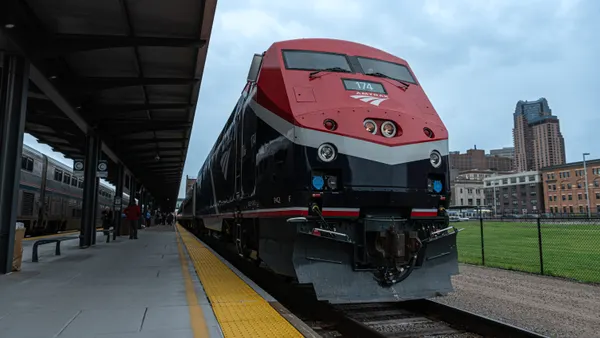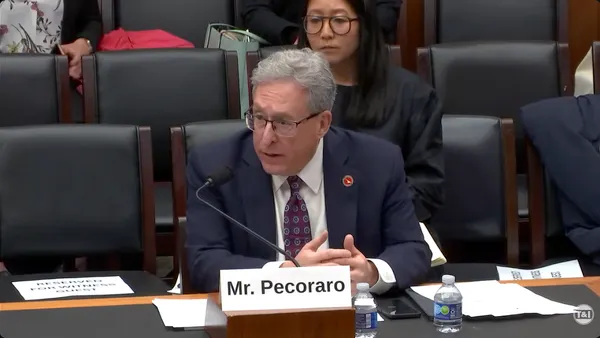Dive Brief:
- Uber's planned aerial ride-hailing service, Uber Air, should be allowed to operate under existing aviation laws and regulations, a top executive said Monday.
- Elevate Uber head Eric Allison said the Federal Aviation Administration (FAA) and other regulators do not need to change existing rules, but interpret them to allow innovative technologies to succeed. Allison added that the company will also work with city and state governments on where to locate skyports.
- "... [W]e can get started by working with regulators to apply the rules in a way that's appropriate for the technology that's new, keeping safety at a very high bar, but interpreting the regulations in a way that's innovative and flexible to take into account the changes the technology is causing in the very place that it's being provided," Allison said at an Uber Elevate event hosted by media company, Politico.
Dive Insight:
At Uber Elevate, filled with prototypes of flying car technology and other Uber products, Allison outlined a vision in which a rider hails an air taxi through the Uber app, is driven to a skyport for take-off, gets into the flying car with four or five passengers, is flown to another skyport to land and then picked up by car to get to the final destination.
Allison said that as technology evolves, it will work in such a way to make sure all steps are "perfectly sequenced."
He said the company has built a simulator to test scenarios. Still, that raises questions about how efficient that trip might be, and whether it will be possible for technology to make it as seamless as he said.
Found myself at a Politico Executive Conversation as part of the Uber Elevate Summit. Soon, we'll hear from Eric Allison, head of Elevate Uber, but first, here's a prototype of a flying car pic.twitter.com/8oa3DlcRhL
— Chris Teale (@chris_teale) June 10, 2019
Cost could be another barrier for wide use. Allison said that at the start of service, slated for 2023, it would cost about $6 per seat per mile, although with wider use that cost should come down.
In a separate speech, Danielle Burr, Uber's head of federal affairs, said "eventually" Uber Air could be similar in price to UberX, the company's personal ride-hailing service. Price remains a concern in many of Uber's new offerings, including Uber Copter, which pledges to get riders from Lower Manhattan to John F. Kennedy International Airport in New York City for $200 or more.
Burr compared conversations today to 10 years ago, when ride-hailing, dockless bikes and self-driving cars were not an option. She said the company sees Uber Air as "one of our most ambitious and exciting projects," and something that will get done, however implausible it may seem to some people.
Allison's pledge to work closely with governments represents a major shift for Uber, which gained a reputation in its early years for arriving in cities unannounced and flouting local laws.
Regulators' ability to creatively interpret aviation rules could be impacted by Monday's deadly helicopter crash into a Manhattan high rise. The investigation is ongoing.
With Uber Air set to test in Los Angeles and Dallas — and offer demo flights as early as next year, Allison pledged — it will be interesting to see how local leaders and residents take to them in those test bed sites. Allison said that through those test flights, "we want to be able to engage with communities sooner, to have community leaders be able to come and see what it is that we're doing, and we can demonstrate the benefit."












